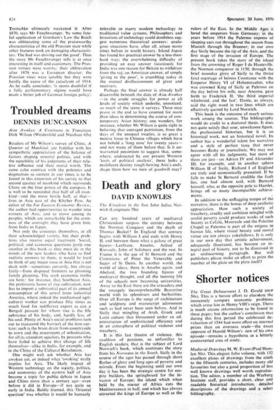Death and glory
D AVID KNOWLES
The Kingdom in the Sun John Julius Nor- wich (Longmans 70s)
Can any hundred years of mediaeval Christendom surpass the century between the Norman Conquest and the death of Thomas Becket? In England that century begins with William 1 and ends with Henry H, and between them what a galaxy of great figures—Lanfranc. Anselm, Aelred of Rievaulx, John of Salisbury and the rest. In France it is the age of St Bernard and the Cistercians, of Peter the Venerable and Suger of St Denis. In another world, the world of ideas, there is Anselm again, and Abelard, the two founding figures of mediaeval thought, and all the teeming life of the schools now becoming universities. Away to the East there are the crusaders and the strangely incomprehensible Byzantine world with its splendours and barbarities. Over all Europe is the surge of architecture and sculpture and manuscript adornment such as had never been seen before. And in Sicily that mingling of Arab, Greek and Latin culture that blossomed under an ad- ministration of sophisticated efficiency and in an atmosphere of political violence and treachery.
It is this last theatre of violence, this cauldron of passions, so unfamiliar to English readers, that is the subject of Lord Norwich's book, which continues the story from his Nornians in the South. Sicily in the course of the ages has passed through short flashes of glory and long ages of poverty and misrule. From the beginning until our own day it has been the strategic centre for em- pire builders, the springboard for the in- vasion of Europe; the island which when held by the master of Africa cuts the Mediterranean in half, and which has always attracted the kings of Europe as well as the rulers of the East. In the Middle Ages it lured the emperors from Germany; in the years before 1914 the Palermo express of sleeping cars ran throughout the season from Munich through the Brenner; in our own day Sicily became the tip of the Axis, and the first stage of the invasion of Europe. The present book takes the story of the island from the crowning of Roger I de Hauteville, the Norman conqueror in 1130, through the brief noonday glory of Sicily to the thrice fatal marriage of heiress Constance with the Emperor Henry VI of Hohenstaufen, who was crowned King of Sicily at Palermo on the day before his wife, near Ancona, gave birth to Frederick II, `the third imperial whirlwind, and the last'. Dante, as always, said the right word in two lines which are effectively quoted by Lord Norwich.
This book is the outcome of much serious work among the sources. The bibliography would do credit to a doctoral thesis. It does not quite satisfy that sour, unwelcome figure, the professional historian, but it is an historical work, not an historical novel. Its author has a wonderful talent for narrative and a style of perfect taste that never becomes flashy or journalistic. We may not agree with all his judgments, but most of them are just—on Adrian IV and Alexander III, for example, and in another sphere William II of Sicily, Richard I of England are truly and economically presented. If he fails to make St Bernard credible the fault lies, one had almost said, with Bernard himself, who, at the opposite pole to Hamlet, brings off so many incompatible achieve- ments.
In addition to the unflagging tempo of the narrative, there is the bonus of deep aesthetic appreciation. How such a society of treachery, cruelty and ambition mingled with sordid poverty could produce works of such beauty as Cefalii, Monreale and the Palatine Chapel at Palermo is part of the enigma in human life, where visual beauty and moral virtue are not always yokefellows. It is only in our own day that artistic achievement, adequately illustrated, has become an in- tegral part of history, not to be dismissed in an undiscerning paragraph. But will publishers please make an effort to print the number of the plate on the plate itself?


































 Previous page
Previous page